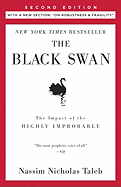Random House, 2nd edition, 2010
Conclusion Taleb argues that we grossly underestimate the unpredictability of the world around us. Unfortunately, his potentially interesting message suffers from a chaotic presentation and a pretentious style.

One of Holland's silly traditions is that around election time an agency called the CPB (het centraal planbureau) takes the programs of the larger political parties and outputs a bunch of numbers: How many jobs will be gained/ lost over the next 40 (!) years if we follow a particular program? What will happen to the energy consumption? And what will be the effect on the level of education? These numbers are taken quite seriously, even though no attempt has ever been made to validate the predictions of the CPB. And I dare say that if any such attempt were ever made the conclusion would be that the CPB can hardly predict what will happen tomorrow, let alone in 40 years from now.
This summer (it was election time) I walked into the university bookstore and saw “The Black Swan”. According to the cover, the book was about our belief that we can predict random events, when, in fact, we can't. At all. How delicious! Needless to say I left the bookstore with “The Black Swan”, by Nassim Nicholas Taleb, under my arm.
 In a nutshell, Taleb argues that we can only say something about a probability if we have some knowledge about the underlying distribution. If we roll a die we know that the probability of getting a 4 (or one of the other faces, for that matter) is 1/6th, because a die has six faces and each face is, to a good approximation, equally likely to come up. However, let's consider another example of “randomness”, the 9/11 attack on the world trade center. Prior to the attack, how likely was such an attack? It was a unique event and therefore one cannot rely on previous occurrences to estimate the probability. In other words, before 9/11 it was not merely unknown whether an attack would occur, the probability of an attack was unknown as well (one might even argue that probability becomes a meaningless term in this context). According to Taleb, this type of “meta-unpredictability” is actually the most important type of unpredictability. But, he argues, people fail to realize this and apply roll-the-dice types of statistics even when this is not appropriate, such as when assigning probabilities to terrorist attacks.
In a nutshell, Taleb argues that we can only say something about a probability if we have some knowledge about the underlying distribution. If we roll a die we know that the probability of getting a 4 (or one of the other faces, for that matter) is 1/6th, because a die has six faces and each face is, to a good approximation, equally likely to come up. However, let's consider another example of “randomness”, the 9/11 attack on the world trade center. Prior to the attack, how likely was such an attack? It was a unique event and therefore one cannot rely on previous occurrences to estimate the probability. In other words, before 9/11 it was not merely unknown whether an attack would occur, the probability of an attack was unknown as well (one might even argue that probability becomes a meaningless term in this context). According to Taleb, this type of “meta-unpredictability” is actually the most important type of unpredictability. But, he argues, people fail to realize this and apply roll-the-dice types of statistics even when this is not appropriate, such as when assigning probabilities to terrorist attacks.
So far so good. Maybe Taleb's ideas are not entirely new, but they are frequently neglected and definitely worth writing a book about. Unfortunately Taleb's writing is unhindered by any sense of modesty. He repeatedly points out that he is a “skeptical empiricist”, so you don't mistake his philosophical treatise for a popular science book. And he actually provides a list of authors that he's re-read (if you're interested, they are Plutarch, Livy, Suetonius, Diodorus, Siculus, Gibbon, Carlyle, Renan and Michelet)! I must admit that I place my trophy-books where guests can see them, but I do so with a certain shame. I don't go around shouting to people: “Did you know that I just read Ulysses? Isn't that awesome of me?"
At some point, Taleb gives the following description of a discussion with a researcher. I think I should quote, because I'm afraid you might not believe me otherwise: “It is hard to focus on a conversation (…) when you have just personally earned several hundreds of times the annual salary of the researcher (…)”. Amazing, isn't it? Even if we disregard the sheer arrogance of this remark, you might like to know that Taleb has made his money as trader. According to himself, the stockmarket is inherently unpredictable and, consequently, he's just plain lucky to have made as much money as he has (good for him, of course, I wish I were so lucky!). Apparently, even though Taleb deals at length with cognitive biases, he fails to note this textbook example of a “self-serving bias” (the tendency to attribute your successes to your own brilliance and your failures to environmental factors, such as inherent unpredictability).
In addition, Taleb jumps erratically from one topic to the next and there is no apparent structure to the book. As a reader, you get the feeling of constantly bumping into unexpected sections, sub-sections, and sub-sections of sub-sections. It's as though the structure of the book mimics the type of unpredictability that Taleb talks about.
In conclusion, I was very disappointed by “The Black Swan”. I liked some of the ideas, but the chaotic structure and pretentious style simply put me off too much.
Get this book on amazon.com, amazon.co.uk
, bol.com or selexyz.nl (1st ed.).



